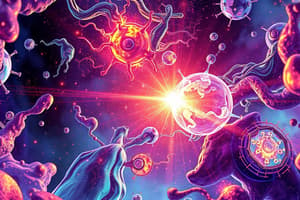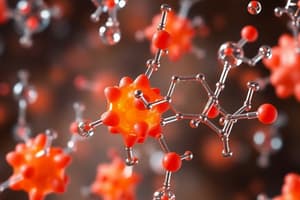Podcast
Questions and Answers
How do enzymes control chemical reactions in the body?
How do enzymes control chemical reactions in the body?
Enzymes are biological molecules that speed up the rate of virtually all of the chemical reactions within cells.
What happens to chemical bonds during a chemical reaction?
What happens to chemical bonds during a chemical reaction?
Chemical reactions always involve changes in the chemical bonds that join atoms in compounds.
Why are enzymes important to living things?
Why are enzymes important to living things?
Enzymes speed up chemical reactions that take place in cells by reducing the energy required to complete the reaction.
How do energy changes affect whether a chemical reaction will occur?
How do energy changes affect whether a chemical reaction will occur?
Reactants are __________.
Reactants are __________.
Products are __________.
Products are __________.
A catalyst is __________.
A catalyst is __________.
Activation energy is __________.
Activation energy is __________.
Enzymes are __________.
Enzymes are __________.
Substrates are __________.
Substrates are __________.
What is catalase?
What is catalase?
Flashcards are hidden until you start studying
Study Notes
Enzymes and Chemical Reactions
- Enzymes are biological catalysts that accelerate chemical reactions in cells.
- They lower the activation energy required for reactions to occur.
Chemical Bonds in Reactions
- Chemical reactions involve breaking and forming chemical bonds between atoms in compounds.
Importance of Enzymes
- Enzymes are crucial for life as they speed up cellular reactions by decreasing energy requirements.
Energy Changes in Reactions
- Reactions that release energy tend to occur spontaneously.
- Energy-absorbing reactions require an external energy source to proceed.
Reactants and Products
- Reactants are the starting elements or compounds in a chemical reaction.
- Products are the resultant elements or compounds formed post-reaction.
Catalysts
- Catalysts are substances that enhance the speed of chemical reactions without undergoing permanent changes themselves.
Activation Energy
- Activation energy is the minimum energy needed to initiate a chemical reaction.
Enzyme Function
- Enzymes are proteins that serve as biological catalysts.
Substrates
- Substrates are the reactants that undergo a chemical change in an enzyme-catalyzed reaction.
Catalase
- Catalase is a prevalent enzyme found in nearly all living organisms.
- It facilitates the breakdown of hydrogen peroxide into water and oxygen.
- Catalase protects cells from oxidative damage caused by reactive oxygen species.
Studying That Suits You
Use AI to generate personalized quizzes and flashcards to suit your learning preferences.



